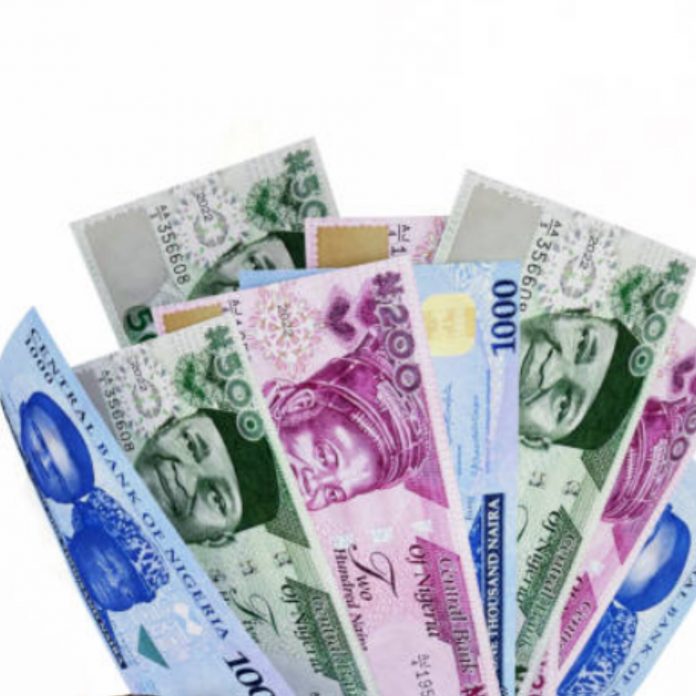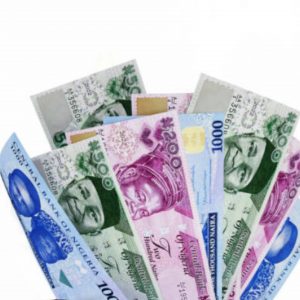Naira
⁰By Akeem Atoyebi
There is a surge in the hawking of naira notes at exorbitant charges in different parts of the country, as Nigerians continue to struggle with limited access to cash in banking halls despite threats by the Central Bank of Nigeria.
The CBN had warned that it would penalise Deposit Money Banks found supporting the hawking of naira notes.
In a circular dated November 13, 2024, signed by the acting Director of Currency Operations, Muhammad Olayemi, and released to the public on Friday, November 15, the CBN warned DMBs against cash hoarding and diversion, emphasising that such actions would attract stiff penalties.
However, our correspondents who monitored the situation in some major cities between Thursday and Friday, reported that while many Nigerians still struggled to access cash in banking halls, hawkers had cash in abundance, selling at exorbitant rates despite the CBN’s month-long threats.
A mint note seller in the Agege area of Lagos, who identified herself as Adebimpe, revealed that she charges N7,000 for N20,000 new notes.
“It is difficult to get cash these days because the bankers have increased their charges. Sometimes, they take as high as N3,000 on N10,000 new notes. We have to add our gains too. It’s business,” she said.
When a banker was approached in Lagos by our reporter pretending to need new mint naira notes, the bank worker disclosed that she often sold N200,000 mint notes for N230,000, making a gain of N30,000.
When asked why some bankers sold naira notes, the worker said, “It is not that you can’t get this cash for free. But the process of getting it inside the bank is not easy. That is why even we, bank workers, have to settle some people to bring the cash notes out for us.”
Another bank worker in Abeokuta, the Ogun State capital, who spoke on condition of anonymity, stated that “cash dealers” who resold at parties and social gatherings boughtN20,000 for N25,000 and N100,000 for N120,000.
He disclosed that freshly minted naira notes were not usually available to bank customers over the counter, “but we have special arrangements for cash dealers who specialise in reselling at parties and social gatherings.”
A cash dealer, who identified herself as Rafiu, told one of our correspondents that there was a high demand for fresh naira notes at weddings and burials.
“The business is lucrative. For instance, we make N8,000 on N20,000, while N100,000 attracts a gain of N25,000 to N30,000. We have arrangements with bank officials who sell naira notes to us at agreed rates,” Rafiu said.
In Osogbo, the Osun State capital, it was gathered that cash trading also thrived, with some hawkers revealing that they bought and sold the mint meant for bank customers.
Investigations revealed that some bank officials prioritised selling mint to high-end clients at agreed prices.
The officials, often from new-generation banks, collaborated with cash dealers to profit from the notes.
A mint seller said, “We always meet outside the bank premises whenever they want to give me the money. Bank officials sell N20,000 worth of mint in N200 denominations to me at N5,000, while I pay between N8,000 and N10,000 for N50,000 worth of mint.”
She added that she resold N20,000 mint at N28,000 and N50,000 mint at N65,000 to customers.
At clubs, she charges N30,000 for N20,000 mint and N70,000 for N50,000 mint.
In Ibadan, Oyo State, a similar trend on Iwo Road, where traders sold cash at increased rates.
Akeem, a trader, disclosed that N10,000 in minted notes now costs N2,000, while N50,000 is sold for N5,000.
Another trader, Ibrahim Bako, attributed the rising rates to the prevailing economic situation.
“Everything has increased. We used to sell N5,000 for N1,000, but now it is N2,000. The difference is small, but it has gone up because of the situation in the country,” he said.
Given the scarcity of money in Imo State, especially for Point of Sale operators, big shops, supermarkets and filling stations have resorted to making extra gain by hawking their cash.
A PoS operator, who gave his name as Emeka, said, “We buy the money from big shops, supermarkets and even filling stations depending on your contacts.”
The owner of a big shop in Ekeonunwa market, who spoke on condition of anonymity, said, “We want to ensure the scarcity of money is addressed.
“Instead of going to the bank to deposit the money and the same bank will collect interest rates and give you less than N20,000 across the counter, it’s better we hawk it to the PoS operators and make extra gain. We don’t sell anything less than N100,000.”
When contacted on Thursday and Friday regarding actions taken by the apex bank weeks after issuing the threat, and how many banks had been sanctioned for disobeying its order, the CBN acting Director of Corporate Communications, Mrs Hakama Ali, did not respond to calls or messages.


